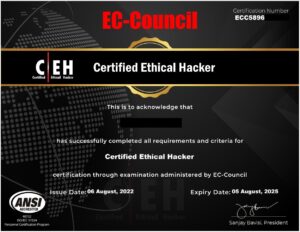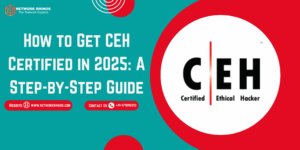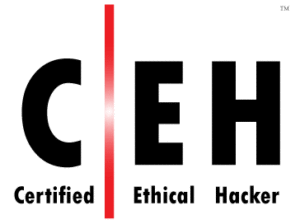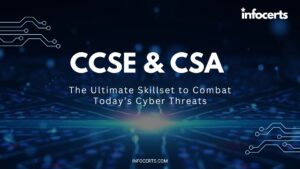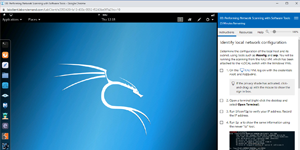Certified Ethical Hacker CEHv12
Infocerts LLP (Official EC-Council ATC)
Worlds No. 1 Credential to build your cyber career.
The gold standard in ethical hacking, the C|EH v12 has earned recognition and trust globally, including from the Department of Defense (DoD), National Cyber Security Centre (NCSC), and more.
Discover why ethical hackers worldwide choose EC-Council’s C|EH v12 to advance their cybersecurity careers. The 12th version of the credential is upgraded with a unique learning framework–Learn, Certify, Engage, and Compete–to help candidates hone their skills against real-life scenarios. Become a Certified Ethical Hacker.
No.1 Certification in ETHICAL HACKING
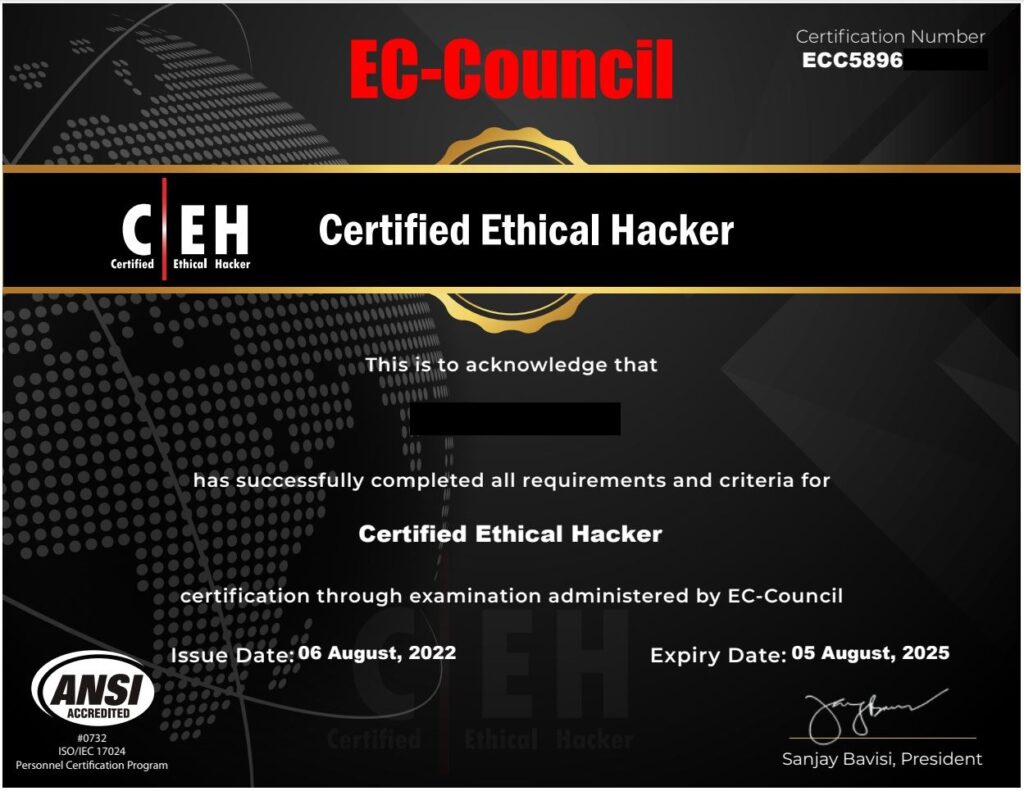
CEH Day 1 Demo
Duration
48 Hours | 5 Days
Fri-Sat-Sun-Sat-Sun
Training Cost
Exam
EC-Council CEH Exam (312-50)
Duration: 4hrs | Questions: 125
Brochure
Accreditation By
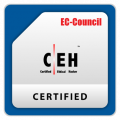
Jobs related to CEH

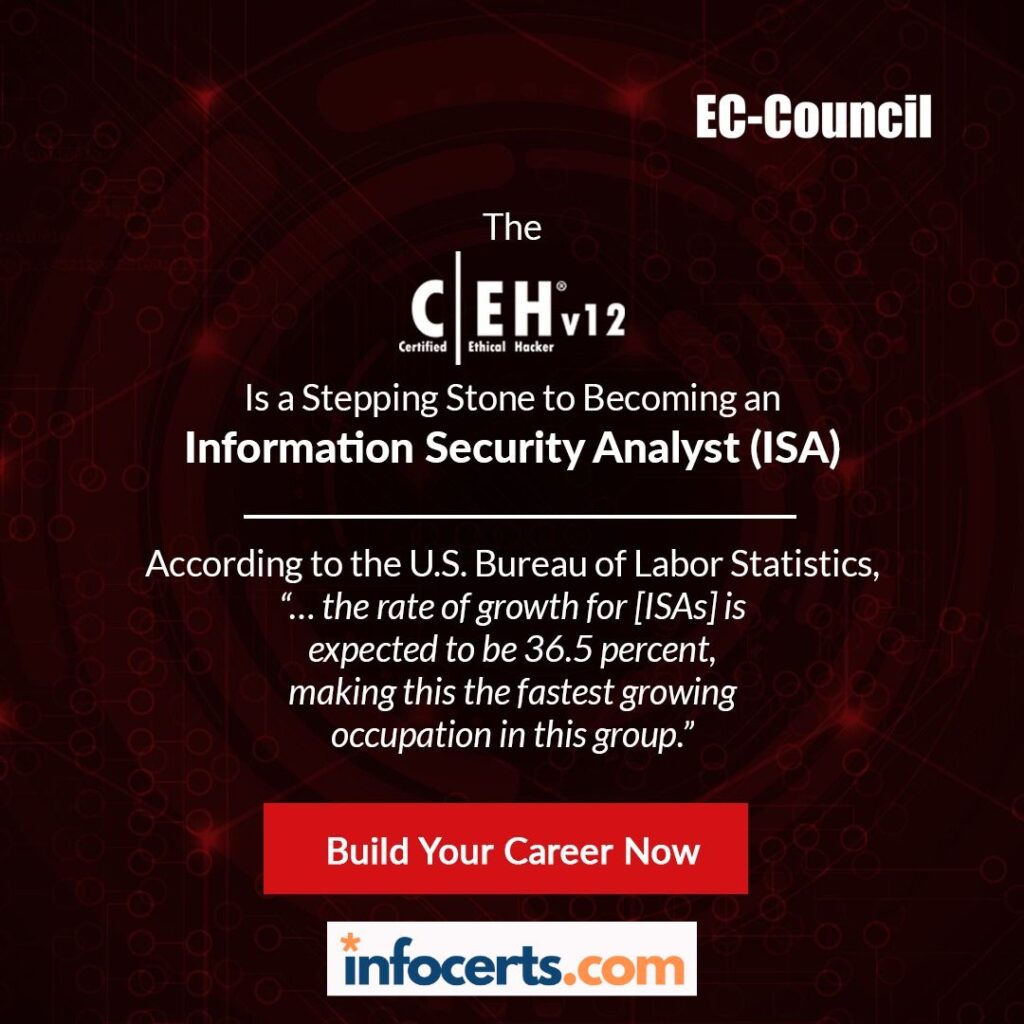
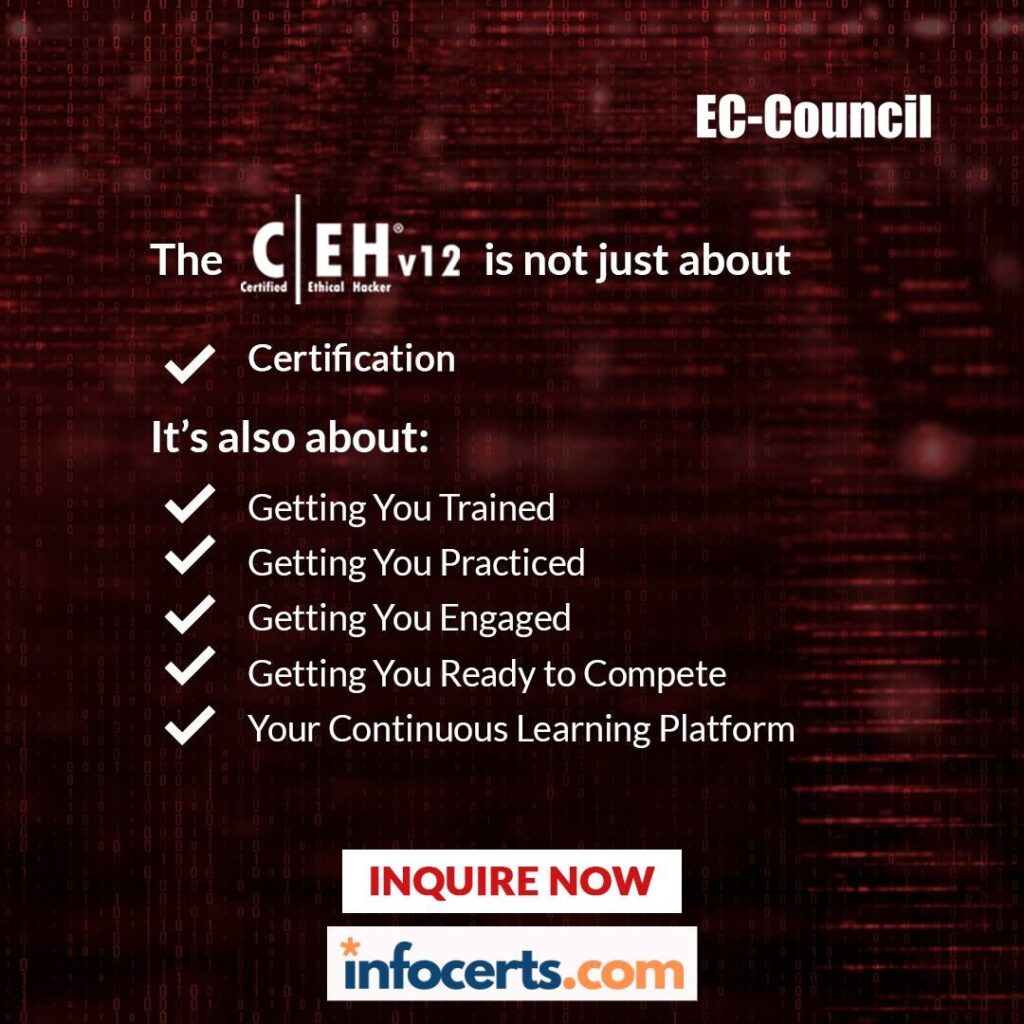

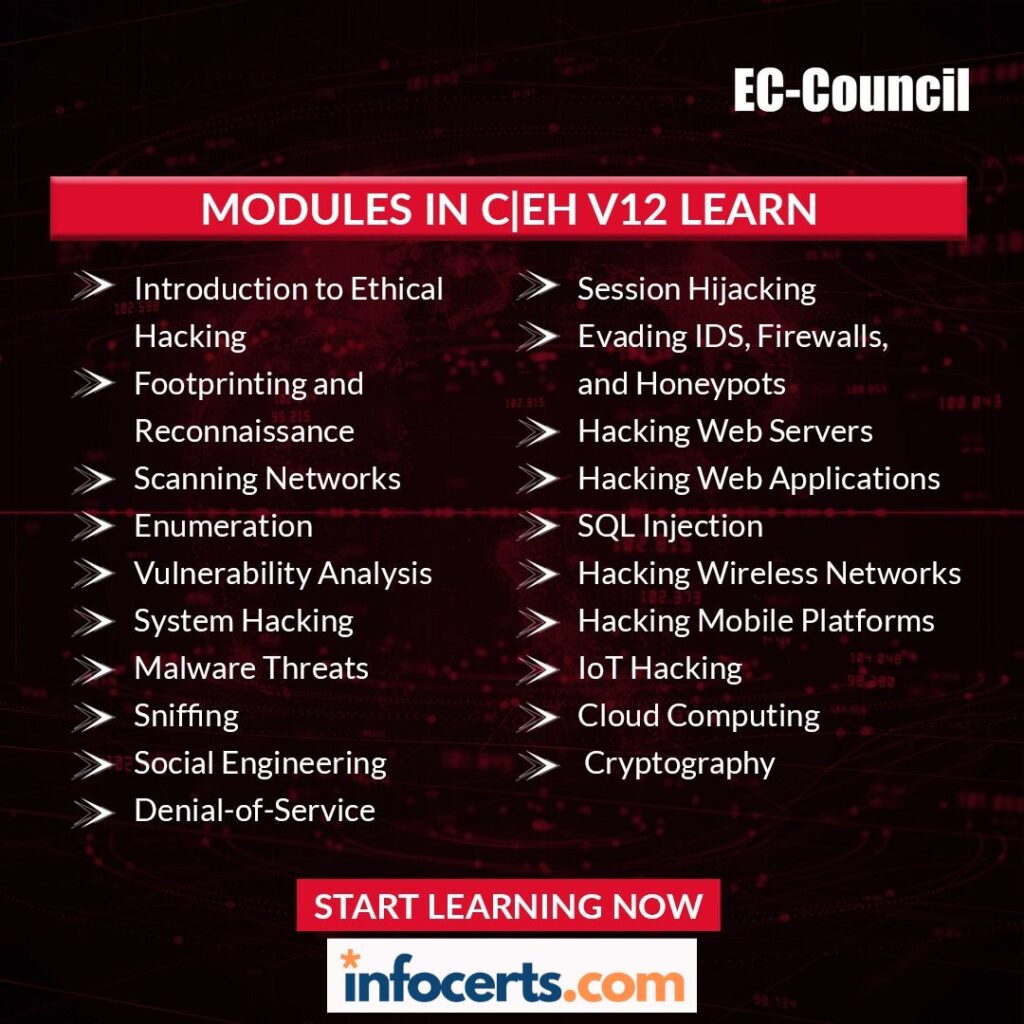

CEHv12 Objectives
After completing the C|EH v12 certification program, you will have a thorough understanding of:
- Ethical hacking fundamentals, cyber kill chain concepts, an overview of information security, security measures, and numerous information security laws and regulations.
- Footprinting concepts and methodologies, as well as using footprinting tools and countermeasures.
- Enumeration techniques include NFS enumeration and related tools, DNS cache snooping, and DNSSEC Zone walking along with the countermeasures.
- Concepts of vulnerability assessment, its categories and strategies, and first-hand exposure to the technologies used in industry.
- Phases of system hacking, attacking techniques to obtain, escalate, and maintain access on the victim and covering tracks.
- Malware threats, analysis of various viruses, worms, and trojans like Emotet and battling them to prevent data. APT and Fileless Malware concepts have been introduced to this domain.
- Packet sniffing concepts, techniques, and protection against the same.
- Social engineering concepts and related terminologies like identity theft, impersonation, insider threats, social engineering techniques, and countermeasures.
- Denial of Service (DoS) and Distributed Denial of Service (DDoS) attacks, use cases, and attack and defense tools.
- Security solutions like firewall, IPS, honeypots, evasion, and protection.
- Operational Technology (OT) essentials, threats, attack methodologies, and attack prevention. The concept of OT is a new addition.
- Recognizing the vulnerabilities in IoT and ensuring the safety of IoT devices.
- Encryption algorithms, Public Key Infrastructure (PKI), cryptographic attacks, and cryptanalysis.
- Cloud computing, threats and security, essentials of container technology, and serverless computing.
Course Outline
- Module 01 : Introduction to Ethical Hacking
- Module 02 : Footprinting and Reconnaissance
- Module 03 : Scanning Networks
- Module 04 : Enumeration
- Module 05 : Vulnerability Analysis
- Module 06 : System Hacking
- Module 07 : Malware Threats
- Module 08 : Sniffing
- Module 09 : Social Engineering
- Module 10 : Denial-of-Service
- Module 11 : Session Hijacking
- Module 12 : Evading IDS, Firewalls, and Honeypots
- Module 13 : Hacking Web Servers
- Module 14 : Hacking Web Applications
- Module 15 : SQL Injection
- Module 16 : Hacking Wireless Networks
- Module 17 : Hacking Mobile Platforms
- Module 18 : IoT and OT Hacking
- Module 19 : Cloud Computing
- Module 20 : Cryptography
Who Should Attend
- Information Security Analyst / Administrator
- Information Assurance (IA) Security Officer
- Information Security Manager / Specialist
- Information Systems Security Engineer / Manager
- Information Security Professionals / Officers
- Information Security / IT Auditors
- Risk / Threat/Vulnerability Analyst
- System Administrators
- Network Administrators and Engineers
Clause: Age Requirements and Policies Concerning Minors
The age requirement for attending the training or attempting the exam is restricted to any candidate that is at least 18 years old.
Job Roles
- Mid-Level Information Security Auditor
- Cybersecurity Analyst Level 1, Level 2,& Level 3
- Cybersecurity Auditor
- Network Security Engineer
- Security Administrator
- SOC Security Analyst
- IT Security Administrator
- Cyber Defense Analyst
- Vulnerability Assessment Analyst
- Warning Analyst
- Security Analyst
- Network Engineer
- Senior Security Consultant
- Information Security Manager
- Information Security Analyst 1
- Senior SOC Analyst
- Security Analyst L1
- Infosec Security Administrator
- Solution Architect
- Cybersecurity Consultant
About the Training & Exam
CEH v12 (ANSI) Exam Info:
Exam Title: Certified Ethical Hacker (ANSI)
Exam Code: 312-50 (ECC EXAM), 312-50 (VUE)
Number of Questions:125
Duration: 4 hours
Availability: ECCEXAM / VUE
Test Format: Multiple Choice
Passing Score: Please refer to https://cert.eccouncil.org/faq.html
How can we help?
Sample Certificate
Latest Blog Post
How to Get CEH Certified in 2025: A Step-by-Step Guide
May 11, 2025 Your complete, no-nonsense guide to becoming a...
Read MoreATT&CK v17: New Platform (ESXi), Collection Optimization, & More Countermeasures
By: Amy Robertson and Adam PenningtonOur goal with ATT&CK v17...
Read MoreMy CEH v12 Certification Journey: Preparation, Resources, and Success
April 17, 2025 Writeup Continue reading on Medium » Article...
Read MoreCCSE & CSA: The Ultimate Skillset to Combat Today’s Cyber Threats
As cyber threats grow more sophisticated, organizations need professionals who...
Read MoreCertMaster Labs for CompTIA Data+ (DA0-001)
March 25, 2025 Buy CertMaster Labs for Data+ (DA0-001) What’s...
Read MoreCertMaster Labs for CompTIA Project+ (PK0-005)
March 25, 2025 Buy CertMaster Labs for Project+ (PK0-005) What’s...
Read MoreCertMaster Labs for CompTIA Server+ (SK0-005)
March 25, 2025 Buy CertMaster Labs for Server+ (SK0-005) What’s...
Read More